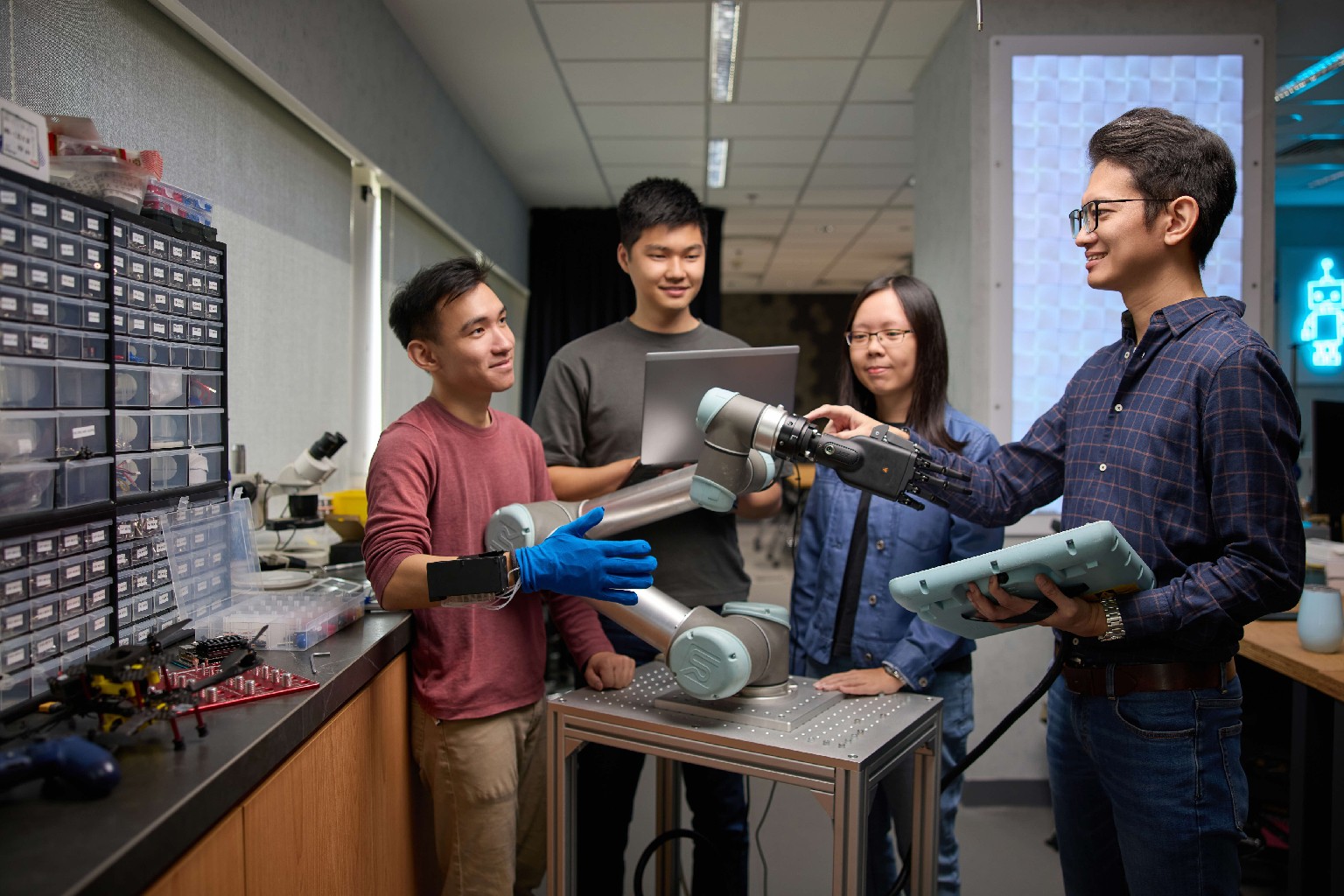Think 100 hours of training sounds like a lot? That just goes to show how much the Home Team Science and Technology Agency (HTX) believes in developing its people. From conferences and exhibitions to collaboration opportunities with the brightest minds in tech, HTX is building its people to help create better tech solutions for Singapore’s security.
In the agency’s distinctive start-up culture, employees take ownership of their own learning and development. There are also job rotation opportunities and exposure to other Home Team departments where they get to see how their work impacts that of first responders.
Here, two HTX officers share their working experiences at the young agency. Founded in 2019, HTX has again made it to the list of the top 250 best employers in Singapore, compiled by global research firm Statista, in collaboration with The Straits Times.

"My team derives a strong sense of purpose from the work they do"
On any given day, the outdoor atrium at Toa Payoh HDB Hub is teeming with commuters, shoppers and residents going about their daily lives. Amidst the bustling crowd, Rover-X, a four-legged robotic dog, spots an unattended piece of baggage and immediately sends an alert in real time to the command centre.
Such a scenario is not something out of a sci-fi movie, but a plausible event that public security agencies prepare for. Once a new command and control system for HTX’s fleet of autonomous robots is ready, Home Team officers from any part of Singapore will be able to remotely dispatch surveillance drones and robots with other capabilities to help on-site officers.
“By augmenting the officers with technology, we can enable them to carry out their duties more effectively, thereby making a positive impact on public safety and the well-being of the communities,” says engineer Chin Zhihao, 42. He is from HTX’s Robotics, Automation and Unmanned Systems (RAUS) team and is the project lead for the new centralised robotics dashboard that allows officers to deploy and control the different robots developed by the team.
Earlier this month, the RAUS team unveiled another addition to its arsenal of robotic tools – cyborg cockroaches that can crawl into tiny spaces too small for humans during search and rescue missions.
Mr Chin is also RAUS team’s acting deputy director, overseeing a team of 12 engineers. He shares that the team is motivated by a strong sense of purpose.
“Knowing our efforts contribute to keeping the Home Team officers safe while enabling them to focus on higher priority tasks brings a deep sense of fulfilment,” he shares.
Continuous learning and development
In order for his team to produce cutting-edge solutions, Mr Chin keeps his eyes peeled for relevant courses and conferences that will advance his engineers’ professional and personal development.
“At RAUS, we put a lot of effort into the growth of our engineers,” he explains.
The agency mandates that each employee – from the junior level all the way to directors – attend 100 hours of training each year. Mr Chin himself attended conferences and technology exhibitions to keep abreast of the latest research and trends in robotics and automation.
He also takes the time to have one-on-one conversations with his team, checking in with them on the resources they need to perform well in their job. He also makes sure that every team member’s work is valued and recognised within the team and the wider organisation.
Aside from nurturing staff, Mr Chin feels what truly sets HTX apart is its emphasis on collaboration — something he says he has personally benefited from.
“Working on cross-functional projects and collaborating with colleagues from different divisions allowed me to broaden my perspective and expand my network within the organisation,” he says.
There are 15 teams in HTX, ranging from RAUS to cybersecurity. HTX also partners external teams to work on certain projects. The cyborg cockroaches, for example, are being developed by HTX together with Nanyang Technological University, and Klass Engineering and Solutions.
This is one of the major differences between HTX and private sector companies, says Mr Chin. “In the private sector, there’s a lot of emphasis on profit and loss, which may not provide a very healthy environment for collaboration,” he says.
At HTX, however, Mr Chin feels the work done serves a bigger purpose beyond the bottom line and helps to create a safe space for collaboration. “That fact that the work we do contributes to the security and safety of our loved ones keeps us motivated,” he adds.

“If we don’t try, we won’t know if the idea can work.”
Wearing multiple hats at work gives Ms Lydia He, 25, more learning opportunities. She is a data scientist as well as an innovations manager in the Partnerships Division at Hatch, HTX's centre for innovation.
“My peers and I wouldn’t be happy in a job where we don’t feel like we’re learning or progressing, but HTX provides both,” says Ms He, who has a master's degree in engineering.
It has been a steep learning curve for her since joining the agency’s Data Science and AI team in August 2022. At Hatch, Ms He helps run Dimension X, a global open innovation challenge to attract deep tech start-ups to refine their technologies for applications in public safety and security.
One such start-up, whose imaging radar technology was originally intended for early-stage breast cancer detection, presented a prototype that can be used to screen baggage.
This non-invasive walk-through scanner is able to detect the presence of hidden metal or non-metal objects without requiring the person to go through a full-body security check.
“I have never worked in a start-up, nor been part of anything in the start-up ecosystem, so everything at Hatch is uncharted territory for me,” say Ms He. “But I learnt a lot from my co-workers and felt inspired by the founders we met, who are passionate about their technologies and taking action to turn ideas into reality.”
At HTX, employees are encouraged to experiment, take ownership of their own learning and think independently. Every fresh graduate who joins HTX is given the opportunity to start and lead a so-called greenfield project in any field, so long as it is a technology development project for technology that does not already exist in the market, and will benefit the Home Team.

Ms He’s greenfield project explores using language learning models and generative artificial intelligence to perform automatic assessments of companies. “It is a fun intersection of two very different areas of work,” she says.
Also known as blue sky research, these greenfield projects are conducted without any specific practical end-use or application in mind so as to spark curiosity and creativity, as well as foster an environment where new ideas are welcome.
“By encouraging HTX officers to be willing to try new, crazy ideas that may not even seem feasible from the start, it opens up Home Team officers to different ways to approach problems,” says Ms He.
Turning failures into success
HTX even goes as far as to issue an Undaunted Award every year to the person or team who has experienced many setbacks or failure but, as the name suggests, remains undaunted.
“We don’t embark on things here expecting them to succeed; that’s not the point of what we do,” says Ms He.
“Rather, it’s about iterating on failures. If we don’t succeed at something, at least we know it won’t work out, so we can start thinking about what can be done instead,” she adds.
She is concurrently working on the development of an improved resource allocation system for the Singapore Prison Service, one of 10 Home Team agencies under the Ministry of Home Affairs.
Through Hatch, Ms He also had the opportunity to work with the Central Narcotics Bureau and Singapore Civil Defence Force (SCDF) to develop tech-powered solutions to help officers at these two Home Team agencies solve crime, save lives and more.
During one of her site visits to the SCDF, she tried on firefighting suits which, while fireproof, were awfully warm and “felt like being in a sauna”. This helped Ms He understand how HTX could help develop a new generation of suits that could be lighter and more breathable, making a tangible difference to those tasked with protecting Singaporeans.
“I always really enjoy seeing how what we do changes and impacts the work of our operational users,” says Ms He. “It reminds us that what we are doing is important.”


